Unit 1 Science Fiction Using Language (Listening and Speaking) 课件(共23张PPT,内镶嵌音频)2024-2025学年高二英语人教版
文档属性
| 名称 | Unit 1 Science Fiction Using Language (Listening and Speaking) 课件(共23张PPT,内镶嵌音频)2024-2025学年高二英语人教版 | 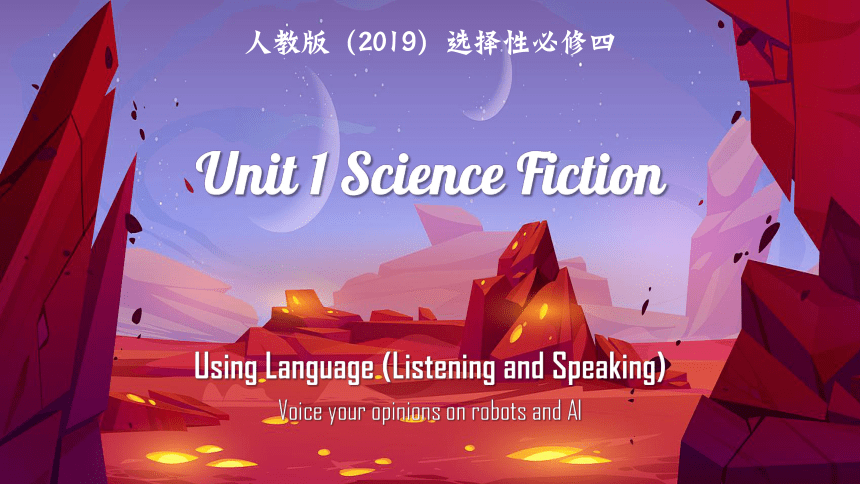 | |
| 格式 | pptx | ||
| 文件大小 | 35.7MB | ||
| 资源类型 | 教案 | ||
| 版本资源 | 人教版(2019) | ||
| 科目 | 英语 | ||
| 更新时间 | 2025-04-17 20:26:05 | ||
图片预览


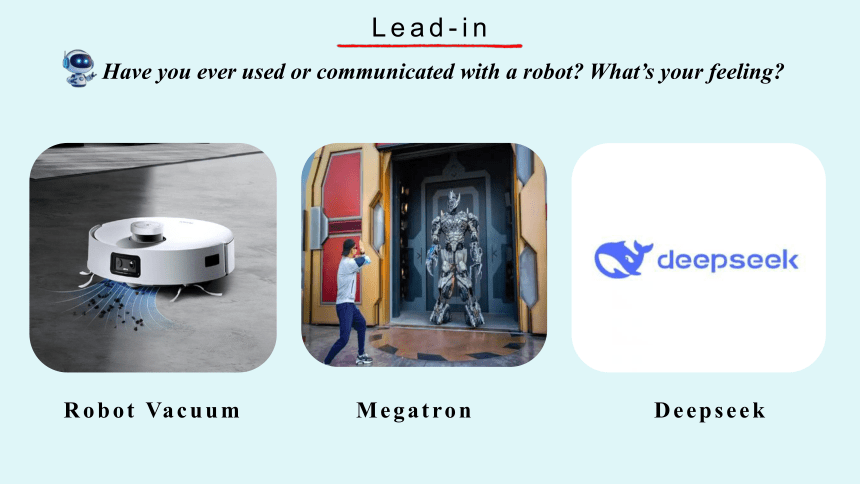
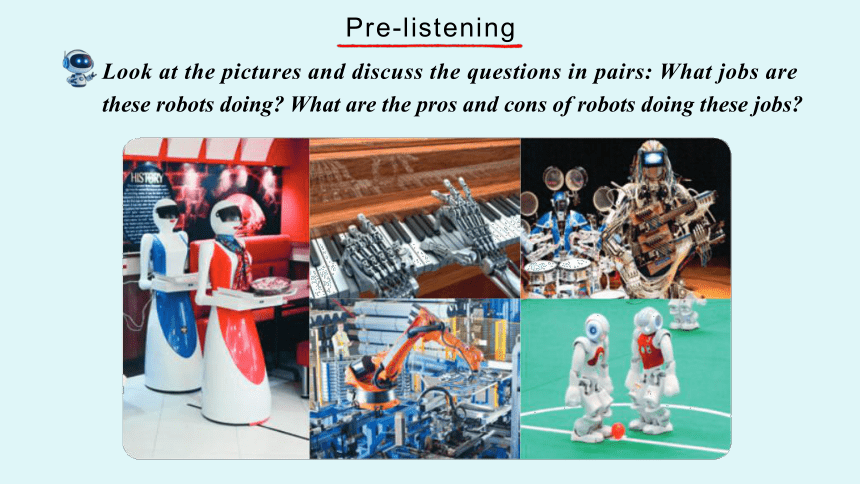
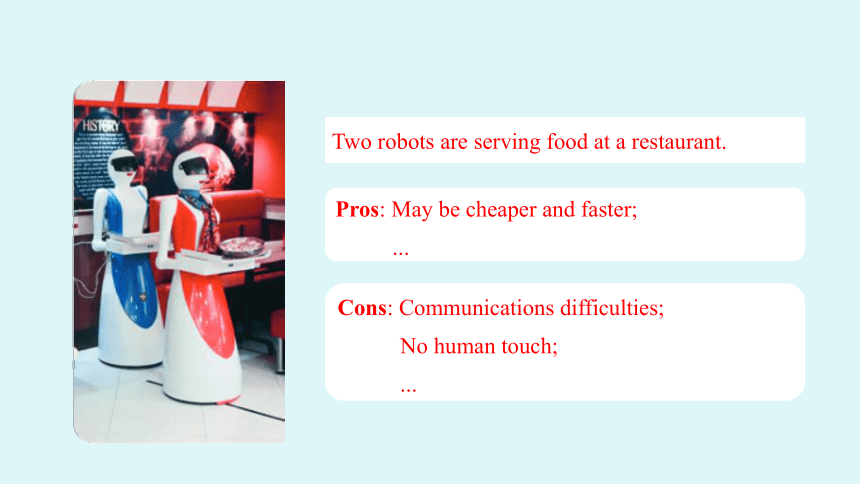
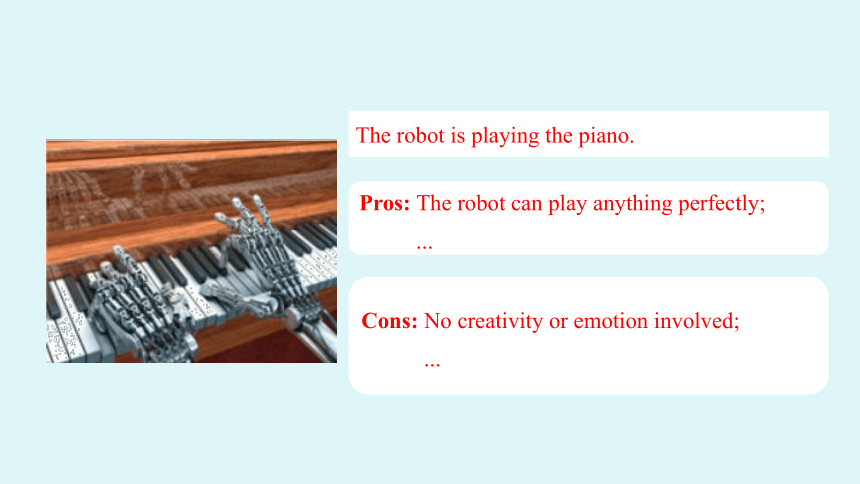


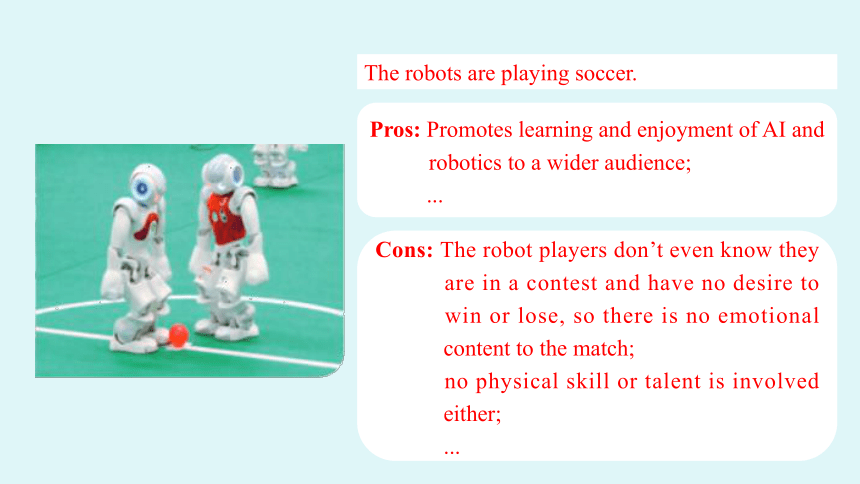
文档简介
(共23张PPT)
人教版(2019)选择性必修四
Unit 1 Science Fiction
Using Language (Listening and Speaking)
Voice your opinions on robots and AI
Learning objectives
By the end of this section, you will be able to:
listen to an interview between the host and a sci-fi expert about robots;
learn to use discourse markers to sort out the logical order of the dialogue by listening to an interview;
discuss your views on the development direction of robots and AI, as well as its pros and cons.
事物的利与弊;支持与反对
Robot Vacuum
Deepseek
Megatron
Lead-in
Have you ever used or communicated with a robot What’s your feeling
Pre-listening
Look at the pictures and discuss the questions in pairs: What jobs are these robots doing What are the pros and cons of robots doing these jobs
Two robots are serving food at a restaurant.
Pros: May be cheaper and faster;
...
Cons: Communications difficulties;
No human touch;
...
The robot is playing the piano.
Pros: The robot can play anything perfectly;
...
Cons: No creativity or emotion involved;
...
A robot band is performing.
Pros: More live music will be available more cheaply;
Playlists will be limitless;
...
Cons: It really isn’t live music;
It is more like listening to a record, without any of the excitement and emotion of watching humans perform;
...
A robotic arm works at a factory.
Pros: Simple, repetitive tasks are done at
higher speeds more cheaply and
accurately;
...
Cons: Humans end up out of work;
No added skill or creativity;
...
The robots are playing soccer.
Pros: Promotes learning and enjoyment of AI and robotics to a wider audience;
...
Cons: The robot players don’t even know they are in a contest and have no desire to win or lose, so there is no emotional content to the match;
no physical skill or talent is involved either;
...
I hope for an educating robot because I can ask any questions when I have troubles in learning.
What kinds of robots or AI developments do you hope for
( ) The host introduces the guest, a sci-fi expert.
( ) The expert has robots in his home.
( ) As robots become more intelligent, they may also become more dangerous.
( ) The host mentions Asimov’s Three Laws of Robotics.
( ) The expert says robots will have occupations such as teaching and nursing.
( ) The line between humans and robots will be more blurred in the future.
( ) The host asks about benefits and problems.
( ) The host asks if there are robots in the expert’s home.
( ) In sci-fi stories, robots often become superior and take over.
1
9
4
5
2
7
3
8
6
While-listening
Listen to an interview and put these statements in the correct order.
(点击播放音频)
adj. 模糊不清的;难以区分的
adj. 更好的;占优势的;(在级别或重要性上)更高的
占上风;取而代之;接管;接手
just now
so
well
but
however
above all
Listen for discourse markers
Discourse markers are used to organise a text by marking sequence, contrast, opinion, purpose, and so on. Listening for discourse markers can help you understand a text more easily. For example, first, however, above all, in order to, etc.
Suggested Answers
Listen to the interview again and write down the discourse markers that you hear. Make a note of how each discourse marker is used in the interview. Then compare your answers with a partner.
(点击播放音频)
Listen again and fill in the blanks.
Host: Welcome back to the show. Just now we talked about time travel with sci-fi _______, Simon Phoenix. So, if we could move on
now, Simon, robots are often in the news these days. Do you think robots will ____________ live among us, and do most of our
jobs for us, like in science fiction
Simon: Well, robots already do many jobs, in factories, for example. But they often do simple tasks and do not look like humans,
unlike in the movies. However, as artificial intelligence ________, we’ll certainly see robots with more complex ___________,
such as teaching or nursing, and we are therefore likely to make them look more like us, so we feel more ___________.
Host: What benefits and problems do you think this would bring
Simon: The main benefit would be greater labour _________, giving us more time for other things. But there would certainly be issues
with _________ them into society. The more intelligent they become, the more _________ and dangerous they will be, too.
Above all, we need to think carefully about how to programme them to ________ us humans.
Host: That _______ me of the Three Laws of Robotics by Isaac Asimov. Is that what you mean
Simon: Yes. That’s a good place to start. Asimov was one of the greatest sci-fi authors, and he wrote the Laws in 1942. _________, he
also showed how the Laws could be broken. I believe he was showing us the problems we would have with such intelligent
machines.
Host: In sci-fi stories, robots often become _______ and take over. Do you think this could really happen If so, should we not build
clever robots
Simon: It is very hard to stop technology once it has been created. Robot technology is developing very fast, so it could be _______.
We use technology more and more in our lives. I think the _____ between humans and robots will be more blurred in the future.
Host: Thanks a lot, Simon. So, I take it that you don’t have any robots at home
Simon: Well ... yes, I do _______!
expert
eventually
develops
occupations
comfortable
efficiency
integrating
powerful
protect
reminds
However
superior
possible
line
actually
(点击播放音频)
What discourse markers do you often use
What are their functions
Post-listening
Summarize discourse makers you often use and think about their functions.
What do you know about robot technology What can robots do
What benefits do you think robots or AI will bring Do you think they will cause problems as well
Do you know anything about Isaac Asimov and his famous Three Laws of Robotics What do you think of these laws
Read the transcript again, then think about the following questions based on the expert’s answer in the interview.
与……冲突或抵触
Robots technology has its cons and pros. It can bring great convenience to human beings together with some scientific or moral problems. A robot is a machine that can do a task according to computer programmes or through the use of some kind of controls.
The main benefits are that they can do some kinds of work more quickly, better, and cheaper than humans, and that they can take the place of humans when no humans are available or when humans cannot do the work. They can cause problems, however. First, what happens if they no longer serve people or stop following orders Second, there is the possibility that at some point we will have difficulty determining what constitutes a living being and what constitutes a machine.
Yes, I do. Isaac Asimov introduced them into most of his science fiction writings to show that robots could be prevented from harming us or our world. They are not actual scientific laws, but rather guidelines for their human programmers to follow to keep our world safe. At first glance, the rules seem logical and reasonable, but they also seem outdated.
Suggested Answers
EXAMPLE
A: Oh, by the way, I saw a programme about robot doctors last night. It was very interesting. Do you think robots will do more of these important jobs in the future
B: Certainly. They will probably do most of our labour for us.
C: Maybe, but that’s beside the point. In my opinion, robots are dangerous! They are much stronger than we are and may be superior to us in the future.
...
In groups, discuss what the expert thinks of the questions and exchange your own views. You may use the following expressions to help you.
n. 劳动(者);体力劳动 vi. 奋斗;努力工作
A: Oh, by the way, I saw a programme about robot doctors last night. It was very interesting. Do you think robots will do more of these important jobs in the future
B: Certainly. They will probably do most of our labour for us.
C: Maybe, but that’s beside the point. In my opinion, robots are dangerous! They are much stronger than we are and may be superior to us in the future.
A: I think we ought to move on to the topic of robot technology. I know the idea of it has been around forever. The ancient Greeks and Chinese both made clever devices that weren’t much different than some of the robots we have today.
B: Yes, but the modern idea of intelligent robots that look like humans is only about 100 years old.
C: I think we had better move onto what robots can do. Let’s see ... there are simple repetitive tasks like factory work and housework.
A: Yes, and I think there will be more complex jobs in the future like in healthcare, education, or entertainment.
C: Oh, there is something else I meant to ask you — does anyone know who even came up with the word “robot”
B: Wasn’t it Isaac Asimov He was that scientist who wrote a lot of science fiction stories.
A: No ... the word robot was coined much earlier, I think.
C: But that’s beside the point. I think we ought to move onto the benefits and dangers of AI to humans and our society ...
A: Oh, I nearly forgot why Asimov’s writing was so important — he created the Three Laws of Robotics. Law 1, robots can’t injure humans or allow them to come to harm; Law 2, a robot must obey any order a human gives it as long as it doesn’t conflict with the first law; and Law 3, a robot must protect itself as long as the act of doing so doesn’t break the first or second laws!
B: But this is where the real danger lies. Those laws are not real laws — they are guidelines that hopefully humans remember when they programme the robots. How can we trust our safety if the robots are programmed by people who don’t keep those rules
C: ...
Suggested Dialogue
What are the pros and cons of robots doing these jobs (P6)
机器人做这些工作的利弊是什么?
pros and cons 事物的利与弊;支持与反对
例句
You’ve thought through your likes and dislikes and the pros and cons of various types of fitness programs.
你已经完全考虑了各种健身计划中你喜欢和不喜欢的以及好的和不好的方面。
This article will take a look at three methods, and then discuss their pros and cons.
这篇文章将引导您观看三种方法,然后对它们进行正反两方面的讨论。
拓展
“优点与缺点”的其他表达法:
advantages and disadvantages, strengths and weaknesses
Language points
1
In sci-fi stories, robots often become superior and take over. (P6)
在科幻小说中,机器人常常会变得更高级,并接管一切。
superior /su p r (r)/ adj. 更好的;占优势的;(在级别或重要性上)更高的
搭配
superior to 比……更好;更胜一筹 (be) superior in 在……方面占优势
例句
It is unbelievable that John has become a judge in a superior court of law.
让人觉得不可思议的是,约翰成了上级法院的一名法官。
Your cellphone is superior to mine in quality.
在质量上,你的手机比我的手机高级多了。
拓展
superiority n. 优越性;优势
2
In sci-fi stories, robots often become superior and take over. (P6)
在科幻小说中,机器人常常会变得更高级,并接管一切。
take over 占上风;取而代之;接管;接手
例句
The company would then take over the accounts.
公司会把那些客户账户接收过来。
Richard will take over as president of the company.
理查德将接任公司总经理职位。
拓展
take in 吸收;欺骗
take on 呈现;雇用
take back 收回(诺言);带回
3
A ROBOT MUST OBEY THE ORDERS GIVEN IT BY HUMAN BEINGS EXCEPT WHERE SUCH ORDERS WOULD CONFLICT WITH THE FIRST LAW. (P7)
机器人必须服从人类的命令,除非这些命令与第一定律相抵触。
conflict with 与……冲突或抵触
拓展
in conflict with ... (over ...) (在……上) 与……有冲突/有争执
come into conflict with ... 与……起冲突/发生争执
例句
She found herself in conflict with her parents over her future career.
她发现自己在将来择业的问题上与父母存在分歧。
When I come into conflict with others, I try to understand them instead of arguing with them. 当我和别人发生冲突时,我试着去理解他们,而不是和他们争论。
4
Homework
Exchange your opinions about robots and AI with your classmates.
人教版(2019)选择性必修四
Unit 1 Science Fiction
Using Language (Listening and Speaking)
Voice your opinions on robots and AI
Learning objectives
By the end of this section, you will be able to:
listen to an interview between the host and a sci-fi expert about robots;
learn to use discourse markers to sort out the logical order of the dialogue by listening to an interview;
discuss your views on the development direction of robots and AI, as well as its pros and cons.
事物的利与弊;支持与反对
Robot Vacuum
Deepseek
Megatron
Lead-in
Have you ever used or communicated with a robot What’s your feeling
Pre-listening
Look at the pictures and discuss the questions in pairs: What jobs are these robots doing What are the pros and cons of robots doing these jobs
Two robots are serving food at a restaurant.
Pros: May be cheaper and faster;
...
Cons: Communications difficulties;
No human touch;
...
The robot is playing the piano.
Pros: The robot can play anything perfectly;
...
Cons: No creativity or emotion involved;
...
A robot band is performing.
Pros: More live music will be available more cheaply;
Playlists will be limitless;
...
Cons: It really isn’t live music;
It is more like listening to a record, without any of the excitement and emotion of watching humans perform;
...
A robotic arm works at a factory.
Pros: Simple, repetitive tasks are done at
higher speeds more cheaply and
accurately;
...
Cons: Humans end up out of work;
No added skill or creativity;
...
The robots are playing soccer.
Pros: Promotes learning and enjoyment of AI and robotics to a wider audience;
...
Cons: The robot players don’t even know they are in a contest and have no desire to win or lose, so there is no emotional content to the match;
no physical skill or talent is involved either;
...
I hope for an educating robot because I can ask any questions when I have troubles in learning.
What kinds of robots or AI developments do you hope for
( ) The host introduces the guest, a sci-fi expert.
( ) The expert has robots in his home.
( ) As robots become more intelligent, they may also become more dangerous.
( ) The host mentions Asimov’s Three Laws of Robotics.
( ) The expert says robots will have occupations such as teaching and nursing.
( ) The line between humans and robots will be more blurred in the future.
( ) The host asks about benefits and problems.
( ) The host asks if there are robots in the expert’s home.
( ) In sci-fi stories, robots often become superior and take over.
1
9
4
5
2
7
3
8
6
While-listening
Listen to an interview and put these statements in the correct order.
(点击播放音频)
adj. 模糊不清的;难以区分的
adj. 更好的;占优势的;(在级别或重要性上)更高的
占上风;取而代之;接管;接手
just now
so
well
but
however
above all
Listen for discourse markers
Discourse markers are used to organise a text by marking sequence, contrast, opinion, purpose, and so on. Listening for discourse markers can help you understand a text more easily. For example, first, however, above all, in order to, etc.
Suggested Answers
Listen to the interview again and write down the discourse markers that you hear. Make a note of how each discourse marker is used in the interview. Then compare your answers with a partner.
(点击播放音频)
Listen again and fill in the blanks.
Host: Welcome back to the show. Just now we talked about time travel with sci-fi _______, Simon Phoenix. So, if we could move on
now, Simon, robots are often in the news these days. Do you think robots will ____________ live among us, and do most of our
jobs for us, like in science fiction
Simon: Well, robots already do many jobs, in factories, for example. But they often do simple tasks and do not look like humans,
unlike in the movies. However, as artificial intelligence ________, we’ll certainly see robots with more complex ___________,
such as teaching or nursing, and we are therefore likely to make them look more like us, so we feel more ___________.
Host: What benefits and problems do you think this would bring
Simon: The main benefit would be greater labour _________, giving us more time for other things. But there would certainly be issues
with _________ them into society. The more intelligent they become, the more _________ and dangerous they will be, too.
Above all, we need to think carefully about how to programme them to ________ us humans.
Host: That _______ me of the Three Laws of Robotics by Isaac Asimov. Is that what you mean
Simon: Yes. That’s a good place to start. Asimov was one of the greatest sci-fi authors, and he wrote the Laws in 1942. _________, he
also showed how the Laws could be broken. I believe he was showing us the problems we would have with such intelligent
machines.
Host: In sci-fi stories, robots often become _______ and take over. Do you think this could really happen If so, should we not build
clever robots
Simon: It is very hard to stop technology once it has been created. Robot technology is developing very fast, so it could be _______.
We use technology more and more in our lives. I think the _____ between humans and robots will be more blurred in the future.
Host: Thanks a lot, Simon. So, I take it that you don’t have any robots at home
Simon: Well ... yes, I do _______!
expert
eventually
develops
occupations
comfortable
efficiency
integrating
powerful
protect
reminds
However
superior
possible
line
actually
(点击播放音频)
What discourse markers do you often use
What are their functions
Post-listening
Summarize discourse makers you often use and think about their functions.
What do you know about robot technology What can robots do
What benefits do you think robots or AI will bring Do you think they will cause problems as well
Do you know anything about Isaac Asimov and his famous Three Laws of Robotics What do you think of these laws
Read the transcript again, then think about the following questions based on the expert’s answer in the interview.
与……冲突或抵触
Robots technology has its cons and pros. It can bring great convenience to human beings together with some scientific or moral problems. A robot is a machine that can do a task according to computer programmes or through the use of some kind of controls.
The main benefits are that they can do some kinds of work more quickly, better, and cheaper than humans, and that they can take the place of humans when no humans are available or when humans cannot do the work. They can cause problems, however. First, what happens if they no longer serve people or stop following orders Second, there is the possibility that at some point we will have difficulty determining what constitutes a living being and what constitutes a machine.
Yes, I do. Isaac Asimov introduced them into most of his science fiction writings to show that robots could be prevented from harming us or our world. They are not actual scientific laws, but rather guidelines for their human programmers to follow to keep our world safe. At first glance, the rules seem logical and reasonable, but they also seem outdated.
Suggested Answers
EXAMPLE
A: Oh, by the way, I saw a programme about robot doctors last night. It was very interesting. Do you think robots will do more of these important jobs in the future
B: Certainly. They will probably do most of our labour for us.
C: Maybe, but that’s beside the point. In my opinion, robots are dangerous! They are much stronger than we are and may be superior to us in the future.
...
In groups, discuss what the expert thinks of the questions and exchange your own views. You may use the following expressions to help you.
n. 劳动(者);体力劳动 vi. 奋斗;努力工作
A: Oh, by the way, I saw a programme about robot doctors last night. It was very interesting. Do you think robots will do more of these important jobs in the future
B: Certainly. They will probably do most of our labour for us.
C: Maybe, but that’s beside the point. In my opinion, robots are dangerous! They are much stronger than we are and may be superior to us in the future.
A: I think we ought to move on to the topic of robot technology. I know the idea of it has been around forever. The ancient Greeks and Chinese both made clever devices that weren’t much different than some of the robots we have today.
B: Yes, but the modern idea of intelligent robots that look like humans is only about 100 years old.
C: I think we had better move onto what robots can do. Let’s see ... there are simple repetitive tasks like factory work and housework.
A: Yes, and I think there will be more complex jobs in the future like in healthcare, education, or entertainment.
C: Oh, there is something else I meant to ask you — does anyone know who even came up with the word “robot”
B: Wasn’t it Isaac Asimov He was that scientist who wrote a lot of science fiction stories.
A: No ... the word robot was coined much earlier, I think.
C: But that’s beside the point. I think we ought to move onto the benefits and dangers of AI to humans and our society ...
A: Oh, I nearly forgot why Asimov’s writing was so important — he created the Three Laws of Robotics. Law 1, robots can’t injure humans or allow them to come to harm; Law 2, a robot must obey any order a human gives it as long as it doesn’t conflict with the first law; and Law 3, a robot must protect itself as long as the act of doing so doesn’t break the first or second laws!
B: But this is where the real danger lies. Those laws are not real laws — they are guidelines that hopefully humans remember when they programme the robots. How can we trust our safety if the robots are programmed by people who don’t keep those rules
C: ...
Suggested Dialogue
What are the pros and cons of robots doing these jobs (P6)
机器人做这些工作的利弊是什么?
pros and cons 事物的利与弊;支持与反对
例句
You’ve thought through your likes and dislikes and the pros and cons of various types of fitness programs.
你已经完全考虑了各种健身计划中你喜欢和不喜欢的以及好的和不好的方面。
This article will take a look at three methods, and then discuss their pros and cons.
这篇文章将引导您观看三种方法,然后对它们进行正反两方面的讨论。
拓展
“优点与缺点”的其他表达法:
advantages and disadvantages, strengths and weaknesses
Language points
1
In sci-fi stories, robots often become superior and take over. (P6)
在科幻小说中,机器人常常会变得更高级,并接管一切。
superior /su p r (r)/ adj. 更好的;占优势的;(在级别或重要性上)更高的
搭配
superior to 比……更好;更胜一筹 (be) superior in 在……方面占优势
例句
It is unbelievable that John has become a judge in a superior court of law.
让人觉得不可思议的是,约翰成了上级法院的一名法官。
Your cellphone is superior to mine in quality.
在质量上,你的手机比我的手机高级多了。
拓展
superiority n. 优越性;优势
2
In sci-fi stories, robots often become superior and take over. (P6)
在科幻小说中,机器人常常会变得更高级,并接管一切。
take over 占上风;取而代之;接管;接手
例句
The company would then take over the accounts.
公司会把那些客户账户接收过来。
Richard will take over as president of the company.
理查德将接任公司总经理职位。
拓展
take in 吸收;欺骗
take on 呈现;雇用
take back 收回(诺言);带回
3
A ROBOT MUST OBEY THE ORDERS GIVEN IT BY HUMAN BEINGS EXCEPT WHERE SUCH ORDERS WOULD CONFLICT WITH THE FIRST LAW. (P7)
机器人必须服从人类的命令,除非这些命令与第一定律相抵触。
conflict with 与……冲突或抵触
拓展
in conflict with ... (over ...) (在……上) 与……有冲突/有争执
come into conflict with ... 与……起冲突/发生争执
例句
She found herself in conflict with her parents over her future career.
她发现自己在将来择业的问题上与父母存在分歧。
When I come into conflict with others, I try to understand them instead of arguing with them. 当我和别人发生冲突时,我试着去理解他们,而不是和他们争论。
4
Homework
Exchange your opinions about robots and AI with your classmates.
